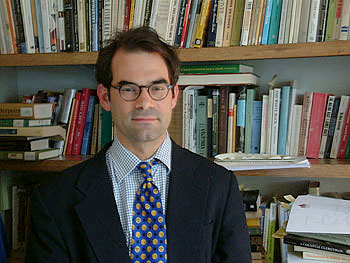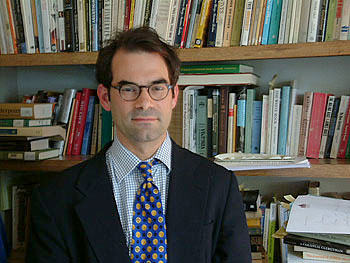Editor’s note: We know there are a lot of Grist readers out there with very strong feelings around eating (or not eating) meat, whether from factory- or farm-raised animals. So, for our next Food Fight debate, we’re going to convene leaders from the “Never!”, “Whatever,” and “Sometimes” camps to discuss how they handle this moral and ethical calculus. If you would like to participate, send an email with your qualifications and links to three writing samples to Food Editor Bonnie Powell. The Food Fight will begin via email this month and be published in early January.
 James McWilliams.Photo: University of Texas James McWilliams makes an odd vegan pamphleteer.
James McWilliams.Photo: University of Texas James McWilliams makes an odd vegan pamphleteer.
In his public writing career, McWilliams, an academic historian, has positioned himself as reasoned defender of the mainstream food industry from well-intentioned but hysterical critics (such as yours truly). His personal food preferences notwithstanding — he is vegan — defending the food industry means defending the meat industry.
Thus back in 2008, he penned a vigorous defense of cloned livestock for The New York Times op-ed page. Aggrieved that critics of biotechnology had loudly opposed cloning, McWilliams insisted that the technology “has the potential to produce products that are safer, healthier and tastier — bacon that has heart-protective Omega 3’s, say, or milk produced by cows that are stronger and thus need fewer antibiotics.” The argument was rubbish — I destroyed it here — but the message was clear: Don’t feel guilty about enjoying bacon from a cloned pig.
A year before, in another Times op-ed chiding people for “eating close to home,” McWilliams rose to the defense of New Zealand’s vast lamb industry. It is “four times more energy-efficient,” he declared, “for Londoners to buy lamb imported from the other side of the world than to buy it from a producer in their backyard.” Again, the argument crumbled on examination, but the message stood tall: When in London, New Zealand lamb is an ecologically and morally sound dinner choice. (To be fair, despite my criticism of that argument, McWilliams still agreed to serve as one of our Food Fight participants on the topic of whether locavores needed math lessons, inspired by an op-ed from another contrarian.)
Perhaps most infamously, McWilliams last year engaged in a bit of fear-mongering around pasture-raised pork, portraying it as less safe than the stuff that comes out of vast hog factories. Yet again mysteriously awarded the podium of the Times op-ed page, McWilliams warned that “free-range pork can be more likely than caged pork to carry dangerous bacteria and parasites.” This time, the sleight-of-hand was so obvious that even the Times editors had to acknowledge it: They appended a note admitting that the original piece had “neglected to disclose” that McWilliams’ argument depended almost entirely on a study financed by the National Pork Board. Moreover, it was intellectual malpractice to pen an article on the relative “safety” of hog-raising regimes without discussing the growing prevalence of antibiotic-resistant staph (known as MRSA) in factory pork.
In this one, McWilliams let his vegan flag fly a bit, suggesting that there’s “only one ethical choice left for the conscientious consumer: a pork-free diet.” But again, the piece delivered a meat-industry-friendly takeaway message: if you’re going to eat pork, you’ll probably want to avoid the farmers market and stick with the stuff from Smithfield and other mega-producers.
Well, McWilliams has since found a home at The Atlantic Food Channel, from which he lobs artfully wrought little polemics that typically end up promoting the interests of Big Food. In his latest piece, McWilliams backtracks a bit. It turns out that he doesn’t support the eating of cloned animals, or industrially raised New Zealand lambs, or non-free-range pork.
It’s just that he’s worried that critiques of industrial meat will spur people to choose meat from pasture-based producers. And as a vegan, he thinks that would be wrong!
McWilliams writes:
Like many people who pay attention to how food is produced, I’ve come to abhor factory farming and the environmental and welfare problems that accompany it. My personal choice to eliminate factory-farmed animal products from my diet largely reflects this abhorrence. Where I break from most conscientious consumers is in my decision to avoid meat from free-range animals and other alternative sources.
He goes on to indict people who eat pasture-raised meat in a rather tedious moral screed against the killing of animals. Now, the question of morality and meat is a vital one, but McWilliams’ bloodless exposition manages to add nothing new or interesting to it. He acknowledges that factory farming “produces 99 percent of the meat we eat,” but never explains why he spends so much energy (and space in high-end media fora) haranguing the other 1 percent.
I can think of two genuinely eloquent and effective moral critics of meat eating who train their rhetorical gifts squarely on the industry itself: Nobel Prize–winning novelist J.M. Coetzee and novelist-turned-nonfiction-writer Jonathan Safran Foer. Could McWilliams be following a careerist strategy, a calculation that with giants like Coetzee and Foer stalking industrial meat, all that’s left for a vegan of his stature to do is to go after the little guys?
Whatever his reasoning, this moralistic vegan must live with the fact that the net effect of his public-intellectual work has been to serve the interests of an industry that treats live animals as industrial inputs, ruthlessly exploiting them while trashing land, water, and public health in the process. McWilliams’ career may be benefiting from this strategy, but his stature as a defender of animal welfare is nil.


